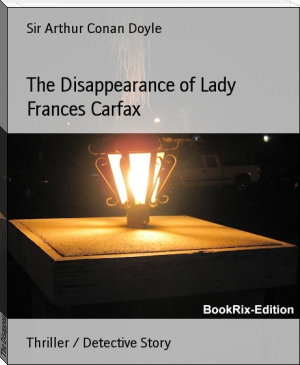His Last Bow - Arthur Conan Doyle (classic books for 12 year olds txt) 📗

- Author: Arthur Conan Doyle
- Performer: -
Book online «His Last Bow - Arthur Conan Doyle (classic books for 12 year olds txt) 📗». Author Arthur Conan Doyle
hire a boat and start for a row, for it was a very hot day, and
they thought, no doubt, that it would be cooler on the water.
“‘It was just as if they had been given into my hands. There was
a bit of a haze, and you could not see more than a few hundred
yards. I hired a boat for myself, and I pulled after them. I
could see the blur of their craft, but they were going nearly as
fast as I, and they must have been a long mile from the shore
before I caught them up. The haze was like a curtain all round
us, and there were we three in the middle of it. My God, shall I
ever forget their faces when they saw who was in the boat that
was closing in upon them? She screamed out. He swore like a
madman and jabbed at me with an oar, for he must have seen death
in my eyes. I got past it and got one in with my stick that
crushed his head like an egg. I would have spared her, perhaps,
for all my madness, but she threw her arms round him, crying out
to him, and calling him “Alec.” I struck again, and she lay
stretched beside him. I was like a wild beast then that had
tasted blood. If Sarah had been there, by the Lord, she should
have joined them. I pulled out my knife, and—well, there! I’ve
said enough. It gave me a kind of savage joy when I thought how
Sarah would feel when she had such signs as these of what her
meddling had brought about. Then I tied the bodies into the
boat, stove a plank, and stood by until they had sunk. I knew
very well that the owner would think that they had lost their
bearings in the haze, and had drifted off out to sea. I cleaned
myself up, got back to land, and joined my ship without a soul
having a suspicion of what had passed. That night I made up the
packet for Sarah Cushing, and next day I sent it from Belfast.
“‘There you have the whole truth of it. You can hang me, or do
what you like with me, but you cannot punish me as I have been
punished already. I cannot shut my eyes but I see those two
faces staring at me—staring at me as they stared when my boat
broke through the haze. I killed them quick, but they are
killing me slow; and if I have another night of it I shall be
either mad or dead before morning. You won’t put me alone into a
cell, sir? For pity’s sake don’t, and may you be treated in your
day of agony as you treat me now.’
“What is the meaning of it, Watson?” said Holmes solemnly as he
laid down the paper. “What object is served by this circle of
misery and violence and fear? It must tend to some end, or else
our universe is ruled by chance, which is unthinkable. But what
end? There is the great standing perennial problem to which
human reason is as far from an answer as ever.”
The Adventure of the Red Circle
“Well, Mrs. Warren, I cannot see that you have any particular
cause for uneasiness, nor do I understand why I, whose time is of
some value, should interfere in the matter. I really have other
things to engage me.” So spoke Sherlock Holmes and turned back
to the great scrapbook in which he was arranging and indexing
some of his recent material.
But the landlady had the pertinacity and also the cunning of her
sex. She held her ground firmly.
“You arranged an affair for a lodger of mine last year,” she
said—“Mr. Fairdale Hobbs.”
“Ah, yes—a simple matter.”
“But he would never cease talking of it—your kindness, sir, and
the way in which you brought light into the darkness. I
remembered his words when I was in doubt and darkness myself. I
know you could if you only would.”
Holmes was accessible upon the side of flattery, and also, to do
him justice, upon the side of kindliness. The two forces made
him lay down his gum-brush with a sigh of resignation and push
back his chair.
“Well, well, Mrs. Warren, let us hear about it, then. You don’t
object to tobacco, I take it? Thank you, Watson—the matches!
You are uneasy, as I understand, because your new lodger remains
in his rooms and you cannot see him. Why, bless you, Mrs.
Warren, if I were your lodger you often would not see me for
weeks on end.”
“No doubt, sir; but this is different. It frightens me, Mr.
Holmes. I can’t sleep for fright. To hear his quick step moving
here and moving there from early morning to late at night, and
yet never to catch so much as a glimpse of him—it’s more than I
can stand. My husband is as nervous over it as I am, but he is
out at his work all day, while I get no rest from it. What is he
hiding for? What has he done? Except for the girl, I am all
alone in the house with him, and it’s more than my nerves can
stand.”
Holmes leaned forward and laid his long, thin fingers upon the
woman’s shoulder. He had an almost hypnotic power of soothing
when he wished. The scared look faded from her eyes, and her
agitated features smoothed into their usual commonplace. She sat
down in the chair which he had indicated.
“If I take it up I must understand every detail,” said he. “Take
time to consider. The smallest point may be the most essential.
You say that the man came ten days ago and paid you for a
fortnight’s board and lodging?”
“He asked my terms, sir. I said fifty shillings a week. There
is a small sitting-room and bedroom, and all complete, at the top
of the house.”
“Well?”
“He said, ‘I’ll pay you five pounds a week if I can have it on my
own terms.’ I’m a poor woman, sir, and Mr. Warren earns little,
and the money meant much to me. He took out a ten-pound note,
and he held it out to me then and there. ‘You can have the same
every fortnight for a long time to come if you keep the terms,’
he said. ‘If not, I’ll have no more to do with you.’
“What were the terms?”
“Well, sir, they were that he was to have a key of the house.
That was all right. Lodgers often have them. Also, that he was
to be left entirely to himself and never, upon any excuse, to be
disturbed.”
“Nothing wonderful in that, surely?”
“Not in reason, sir. But this is out of all reason. He has been
there for ten days, and neither Mr. Warren, nor I, nor the girl
has once set eyes upon him. We can hear that quick step of his
pacing up and down, up and down, night, morning, and noon; but
except on that first night he had never once gone out of the
house.”
“Oh, he went out the first night, did he?”
“Yes, sir, and returned very late—after we were all in bed. He
told me after he had taken the rooms that he would do so and
asked me not to bar the door. I heard him come up the stair
after midnight.”
“But his meals?”
“It was his particular direction that we should always, when he
rang, leave his meal upon a chair, outside his door. Then he
rings again when he has finished, and we take it down from the
same chair. If he wants anything else he prints it on a slip of
paper and leaves it.”
“Prints it?”
“Yes, sir; prints it in pencil. Just the word, nothing more.
Here’s the one I brought to show you—soap. Here’s another—
match. This is one he left the first morning—daily gazette. I
leave that paper with his breakfast every morning.”
“Dear me, Watson,” said Homes, staring with great curiosity at
the slips of foolscap which the landlady had handed to him, “this
is certainly a little unusual. Seclusion I can understand; but
why print? Printing is a clumsy process. Why not write? What
would it suggest, Watson?”
“That he desired to conceal his handwriting.”
“But why? What can it matter to him that his landlady should
have a word of his writing? Still, it may be as you say. Then,
again, why such laconic messages?”
“I cannot imagine.”
“It opens a pleasing field for intelligent speculation. The words
are written with a broad-pointed, violet-tinted pencil of a not
unusual pattern. You will observe that the paper is torn away at
the side here after the printing was done, so that the ‘s’ of
‘soap’ is partly gone. Suggestive, Watson, is it not?”
“Of caution?”
“Exactly. There was evidently some mark, some thumbprint,
something which might give a clue to the person’s identity. Now.
Mrs. Warren, you say that the man was of middle size, dark, and
bearded. What age would he be?”
“Youngish, sir—not over thirty.”
“Well, can you give me no further indications?”
“He spoke good English, sir, and yet I thought he was a foreigner
by his accent.”
“And he was well dressed?”
“Very smartly dressed, sir—quite the gentleman. Dark clothes—
nothing you would note.”
“He gave no name?”
“No, sir.”
“And has had no letters or callers?”
“None.”
“But surely you or the girl enter his room of a morning?”
“No, sir; he looks after himself entirely.”
“Dear me! that is certainly remarkable. What about his luggage?”
“He had one big brown bag with him—nothing else.”
“Well, we don’t seem to have much material to help us. Do you
say nothing has come out of that room—absolutely nothing?”
The landlady drew an envelope from her bag; from it she shook out
two burnt matches and a cigarette-end upon the table.
“They were on his tray this morning. I brought them because I
had heard that you can read great things out of small ones.”
Holmes shrugged his shoulders.
“There is nothing here,” said he. “The matches have, of course,
been used to light cigarettes. That is obvious from the
shortness of the burnt end. Half the match is consumed in
lighting a pipe or cigar. But, dear me! this cigarette stub is
certainly remarkable. The gentleman was bearded and moustached,
you say?”
“Yes, sir.”
“I don’t understand that. I should say that only a clean-shaven
man could have smoked this. Why, Watson, even your modest
moustache would have been singed.”
“A holder?” I suggested.
“No, no; the end is matted. I suppose there could not be two
people in your rooms, Mrs. Warren?”
“No, sir. He eats so little that I often wonder it can keep life
in one.”
“Well, I think we must wait for a little more material. After
all, you have nothing to complain of. You have received your
rent, and he is not a troublesome lodger, though he is certainly
an unusual one. He pays you well, and if he chooses to lie
concealed it is no direct business of yours. We have no excuse
for an intrusion upon his privacy until we have some reason to
think that there is a guilty reason for it. I’ve taken up the
matter, and I won’t lose sight of it. Report to me if





Comments (0)